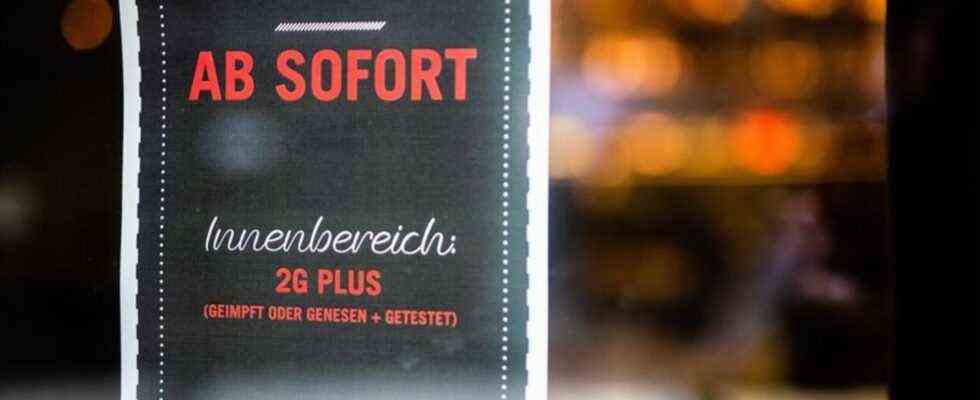Fight against Corona
Scholz is campaigning for acceptance of tougher corona restrictions
A poster informs guests at the entrance of a restaurant in Stuttgart about the new 2G Plus rule. Photo: Christoph Schmidt / dpa
© dpa-infocom GmbH
In order to curb the high number of infections, stricter everyday rules apply again – especially for those who have not been vaccinated. Shortly before the start of the new government, the still-chancellor sends a farewell warning.
In the fight against the corona wave, the designated Federal Chancellor Olaf Scholz (SPD) has campaigned for acceptance for tougher cuts, especially for those who have not been vaccinated.
“Restrictions for togetherness” should have been set again, which are difficult to bear after all this long time, he said in Berlin on Saturday. “But precisely because we haven’t had enough vaccinations, we have to do it all over again.” The outgoing Chancellor Angela Merkel (CDU) once again called for solidarity and more vaccinations: “Take the insidious virus seriously.” At least 13 million people who have been vaccinated have now also received a booster dose.
Scholz made it clear that 2G access regulations are only possible for vaccinated and convalescent people to restaurants, cultural institutions or shops. Far-reaching measures should have been taken for all citizens last winter. “Now we can concentrate on regulations that are aimed at those who have not used this protection option for themselves.” That is justifiable. There is now the opportunity to do something every day, said Scholz, with a view to increased vaccination offers.
The Chancellor-designate called it “the most important first task we must tackle”, protecting the health of citizens and fighting the pandemic. “A whole new campaign” must also come on the way, so that millions of people could be vaccinated, “now this month of December”. The federal and state governments have set the target of up to 30 million first, second and booster vaccinations by the end of the year – based on the vaccination status at the previous federal-state round on November 18.
Merkel said in her last weekly video message: “We are in the middle of this fourth wave of pandemics in a very serious situation, in some parts of our country it can only be called dramatic”. She referred to “overcrowded intensive care units”, seriously ill people who would have to be flown across Germany, and the “so terribly high number” of people who were killed by the virus. “It’s so bitter because it could be avoided.” Every vaccination helps. Merkel thanked everyone “who are sensible and understanding during this difficult time” and who adhered to the rules out of self-protection and care.
According to resolutions by the federal and state governments, a number of stricter measures are to take effect during Advent. These include audience restrictions at major events and extensive contact restrictions for those who have not been vaccinated. They are also denied entry to most of the shops during the Christmas season. The New Year’s Eve sale is banned.
City Council calls for support
The city council called for more support from the police for controls of the specifications. “Not just on occasion, but through increased presence at Christmas markets and in public spaces,” said General Manager Helmut Dedy of the German Press Agency. Retailers or restaurateurs are initially responsible for checking the 2G certificates. The regulatory agencies were already more present and carried out random checks in city centers and shopping streets. There must be controls where there are frequent violations. “And it is also sanctioned with fines.”
There were 896,000 more corona vaccinations on Friday, according to data from the Federal Ministry of Health from Saturday. The outgoing head of department Jens Spahn (CDU) explained that in the past three days a total of almost three million vaccinations were made. At least 57.3 million people or 68.9 percent of citizens now have full basic protection with the second injection, which is usually necessary.
In the coming week, further new corona regulations are expected to be discussed and resolved in the Bundestag with two extra meetings on Tuesday and Friday, as it was said from circles of the future traffic light coalition factions. Among other things, this involves the planned mandatory vaccination for staff in facilities with risk groups such as nursing homes. One of the target dates discussed was that previous employees would have to be fully vaccinated by mid-March 2022.
In addition, an extension of the vaccination authorization beyond doctors, for example to pharmacists and dentists, is to be regulated. Another aspect is likely to be compensation payments to clinics for postponed treatments. The left criticized the targeted special sessions. It serves neither the legal peace in the country nor the growing insecurity in the population if laws are changed every month, complained Left parliamentary group manager Jan Korte in a letter to the SPD, FDP and the Greens, which the dpa had before.
The German Foundation for Patient Protection campaigned to focus more on testing. “There is only 2G, and we hide everything else,” said board member Eugen Brysch of the dpa. Regulatory authorities are not in a position to control this across the board. In addition, there would be problems with forged evidence. Brysch spoke out in favor of extra tests for those who had been vaccinated and those who had recovered. “2G plus is the concept that will not only get us through winter, but also through 2022.” So far there has been a lack of concepts.
The virus spread has accelerated again slightly. According to the Robert Koch Institute (RKI), the number of reported new infections per 100,000 inhabitants in seven days rose nationwide to 442.7 after 442.1 the previous day and 444.3 a week ago. 64,510 new cases were reported in one day and another 378 deaths.

